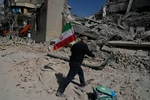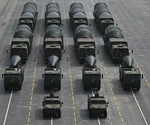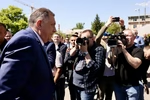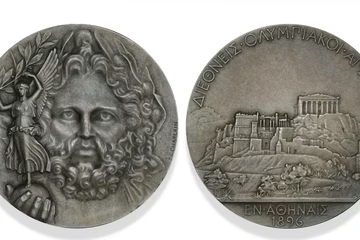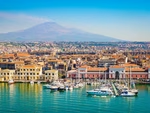
As families were burying their beloved ones on the 23rd anniversary of the Srebrenica genocide, foreign and local officials expressed their condolences and reminded that the lessons of Srebrenica must never be forgotten.
Bosnia’s top international official, Austrian official Valentin Inzko, expressed his outrage over the fact that some Bosnian Serbs still deny the atrocity everoccured.
"It is horrible that there are still people who deny this genocide has ever happened. We had a similar situation in Austria with people who denied the Holocaust. A professor had even to go to jail for three years. A man who wore socks with the number 88 on them was punished for it," Inzko said.
The number 88 symbolized the Nazi greeting Heil Hitler.
"Srebrenica was a planetary tragedy," the High Representative said.
"The feeling that people were killed in an organised and planned manner is difficult but we have to build a new Bosnia and Herzegovina in which life will be stronger than death," he said.
Inzko added that the international community was also guilty for what happened and that some international officials acknowledged that.
"They showed that they were not able to stop this until Clinton and his aides came in," he added.
U.S. President Bill Clinton has led the effort to end Bosnia’s war with force and with diplomacy, which in the end resulted in Bosnia’s 1995 peace agreement, known as the Dayton Peace Accord.
European Union High Representative for Foreign Affairs and Security Policy, Federica Mogherini, and Commissioner for EU enlargement, Johannes Hahn, said in a joint statement that the commemoration "reminds us of one of the darkest moments of humanity and modern European history, and of our responsibility to prevent such an atrocity from ever happening again."
The future lies in reconciliation, in avoiding divisive actions and rhetoric, in collective respect, recognition and remembrance, they said.
"The European Union will continue to support the citizens of Bosnia and Herzegovina to overcome the legacy of the past and advance the country on its European path," the statement said.
The Bosniak member of the country’s three-member Presidency, Bakir Izetbegovic, said during the commemoration in Potocari that "the depth of the crime is understandable only to criminals," and called on those who know where the mass graves that are hiding the rest of the nearly 1,000 victims that have not yet been found to speak up.
"A normal human being can not comprehend that a crime of this magnitude could happen in Europe at the end of the 20th century," Izetbegovic said. "We have been asking ourselves for 23 years what the reasons were."
"To kill a man you see for the first time, who has done nothing to you, to kill a six months pregnant woman, those depths of evil are understandable only to criminals," he said.
He called on Inzko to make use of the wide powers he has in Bosnia.
Some Bosnian Serb politicians are still hailing convicted war criminals as heroes, naming public buildings after them.
"The Bosniaks were betrayed by the international community the moment an arms embargo was imposed on them, the (UN) protected enclave (Srebrenica) was betrayed but the message that Radovan Karadzic is a hero is a terrible one. We can’t fix that but I am urging you in front of these people to do that," he said.
The President of the Liberal Democraticparty of Serbia, Cedomir Jovanovic, said that the ceremony in Potocari was the clearest picture of "the madness that is still breathing down our neck."
Jovanovic is one of the rare politicians from Serbia who attends the July 11 commemorations for years already.
"It seems to be that the Bosniaks were the victims here once 23 years ago but that my people (Serbs) and all those who are denying the Srebrenica genocide are victims every day," he said.
Jovanovic often claimed that unless Serbs admit the atrocities that have been committed in their name during the war, they won't be able to move forward.
German prosecutor Klaus Zorn, who interviewed numerous victims in Bosnia, said that genocides, crimes against humanity and war crimes are still being committed every day all over the word although the phrase 'never again' is being constantly repeated.
He said that his country had opened its doors for Bosnian refugees and that many perpetrators slipped through it.
"But from the very start, police and prosecutors have been searching for the perpetrators who have tried to hide in Germany by mixing with refugees. Our goal is to show that there is no safe haven and no impunity for the perpetrators," he said.
Germany made the first ever arrest of a Bosnian war criminal. Dusko Tadic was caught in Munich in 1994 and handed over to The Hague.
Dunja Mijatovic, the Council of Europe Commissioner for Human Rights, urged politicians to show more empathy for the families of the victims and make searching for those still missing a priority.
"The lack of political will is a phrase, a cheap excuse for covering up war crimes," she said. "It’s time to change that."
"Today, as we are mourning the victims, let’s remind ourselves that by punishing the criminals and by opening a dialogue, this society can meet the requirements for a cohesion and reconciliation. That’s the only way to stand up to the crimes," she said.
Olufemi Elias, the Registrar of the International Residual Mechanism for Criminal Tribunals, which was created to finish the job of the International Criminal Tribunal for former Yugoslavia, ICTY, after it closed in December last year, attended the ceremony as well and said that some of the perpetrators of the 1995 genocide and other crimes committed during Bosnia’s 1992-95 war have still not been brought to justice.
Crimes like this "must not be repeated anywhere in the world," he told N1.
The President of the Mechanism, Judge Theodor Meron, said in a statement that in many cultures, people remember and honour a loved one by lighting a candle as it’s flame is a symbol of both the extraordinary spark of life as well as it’s fragility.
"But a candle’s flame is also a source and symbol of illumination; both figuratively and literally, it brings light to the shadows and stands for truth and knowledge in the face of darkness," the statement said.
As people in Potocari and all over the world pause and pay their respects to the victims, they are also responsible for ensuring "that the lessons of Srebrenica are never forgotten, and that we each do our part to spread the light of truth and to push back against the darkness of indifference and denial," the statement said.
Kakvo je tvoje mišljenje o ovome?
Učestvuj u diskusiji ili pročitaj komentare





 Srbija
Srbija
 Hrvatska
Hrvatska
 Slovenija
Slovenija








